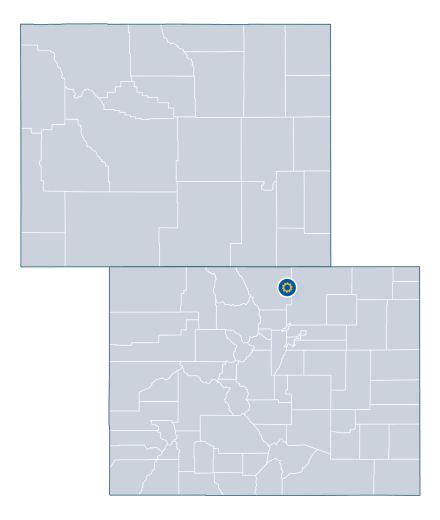The NSF Advanced Sensing and Computation for Environmental Decision-making (ASCEND) Engine in Colorado and Wyoming is a place-based innovation ecosystem designed to transform cutting-edge research in advanced sensing and computation for environmental decision-making into economic and societal impact. With Colorado and Wyoming facing increasing challenges — including wildfires, water scarcity, soil degradation and extreme weather events — this region serves as a strategic testbed for high-impact, technology-driven adaptation strategies. By harnessing advanced sensing, AI-driven analytics, and data-informed decision-making, the NSF ASCEND Engine accelerates the development of scalable resilience solutions.
The NSF ASCEND Engine operates across the entirety of both states, addressing the significant resiliency challenges faced by the region. Over the past two decades, Colorado and Wyoming have experienced intensifying droughts, wildfires, soil degradation and air quality concerns, making them an ideal proving ground for innovative adaptation strategies. The region's diverse environmental conditions, from high desert plains to mountain ecosystems, present a unique opportunity to develop, test and scale next-generation resilience technologies that empower communities to better monitor, mitigate and adapt to impacts.
The innovation strength of the NSF ASCEND Engine is strategically concentrated along the I-25 Innovation Corridor, spanning from Cheyenne and Laramie in Wyoming through Fort Collins, Boulder and Denver, to Colorado Springs. This corridor is home to leading research institutions, national laboratories, startups and industries, forming a highly connected technology and economic hub that drives innovation. The engine's impact will extend statewide, leveraging partnerships to ensure that rural and tribal communities benefit from science and technology-backed resilience solutions, economic development opportunities and access to cutting-edge technologies. The following map shows the region of service for the NSF ASCEND Engine.
Year 1 impacts:
- Accelerating innovation: The NSF ASCEND Engine awarded $3 million in grants to support groundbreaking resilience projects across Colorado and Wyoming. These inaugural investments focus on research, development and commercialization projects that tackle critical resilience challenges, such as water security, wildfire prediction and response, extreme weather modeling, soil carbon sequestration and methane emissions mitigation. The Engine awarded three translational grants in soil health and air quality and awarded five research and development grants in wildfire risk and prediction, water quality, air quality and soil health.
Building partnerships: One year in, the NSF ASCEND Engine's broad coalition of partners has grown to more than 40 academic, industry and community organizations and stakeholders that represent the nation's key players at the intersection of advanced technology and disaster preparedness. The NSF Engine also launched a new partnership with the Resilience Innovation Hub's Future Proofing America Collaborative™ to enhance water management systems, incentivize resilience investments and develop financial tools to protect infrastructure in the face of escalating natural disaster threats in the western United States. Most recently, the NSF Engine assembled a governance board comprised of leaders in renewable energy, aerospace, agriculture, academia, Indigenous affairs, national laboratories, economic development, climate science and advanced technology. Their combined expertise will advance technologies, foster workforce innovation and fuel economic growth in the Mountain West.
The NSF Engine convened with state officials from Colorado and Wyoming to explore ways to better collaborate with state and local government on efforts to advance regional resilience technologies. The NSF Engine also began working to establish meaningful relationships with local tribal communities, hosting monthly tribal strategy meetings with tribal leaders to better understand their unique needs and priorities. By leaning into active listening and collaboration, the NSF Engine is fostering partnerships that address the concerns of rural communities and ensure that communities of all sizes have a voice in shaping initiatives in the region.
Expanding and training the future workforce: The United States faces a critical shortage of skilled workers in fields essential to community resilience, including systems engineering, data science and technology. To help address these gaps, the NSF ASCEND Engine will leverage an Opportunity Now Colorado Grant, which awarded $1.4 million to Innosphere (the lead organization for the NSF Engine) to collaborate with Colorado State University and regional employers. This funding supports the development of internships focused on building a robust systems engineering workforce, addressing shortages in cleantech and aerospace industries, and creating career pathways for both students and industry professionals. Additionally, the engine partnered with Metropolitan State University of Denver and Colorado Community College System to launch an internship program that provides students with hands-on opportunities in technology innovation. In December, in partnership with the Wyoming Innovation Partnership, the NSF ASCEND Engine established a new Software Development Experiential Learning Program to create fast-track pathways for students to obtain software development skills and certifications at local community colleges. Additionally, in January 2025, the NSF Engine partnered with the University of Wyoming Extension 4-H program to inspire Wyoming youth through hands-on robotics education, providing robotics equipment and STEM curriculum to schools in two counties. To further expand access, the NSF Engine also launched a Microsoft365 certification program that will foster skill-building opportunities.
The NSF ASCEND Engine Fellowship Program connects passionate individuals with groundbreaking resilience initiatives. This program places fellows at the forefront of innovation and collaboration, addressing critical challenges in areas like data science, social science and market finance. Fellows will lead efforts to organize and enhance shared data assets, develop strategies for market-based resilience finance and drive interdisciplinary collaboration.
- Growing the local economy: NSF ASCEND Engine partner Metro Denver Economic Development Corporation continued to focus on business recruitment efforts. The team generated expansion leads via domestic expansion trips within U.S. markets, foreign recruitment trips to Ireland and Korea, and engagement in domestic tech conferences. 2024 recruitments to Colorado included: Safran Space & Defense and Astro Digital, which added 205 total jobs. Only a few months after its inception, the NSF ASCEND Engine launched a startup support program to empower early-stage companies driving resilience technology innovation. The Engine supported 14 startup companies with customized one-to-one support tailored to the needs of each startup, as well as connections to corporate partners and investors to help early-stage companies scale solutions in water quality, soil health, air quality and wildfire preparedness. Building on that momentum, in November, the NSF Engine announced the launch of its groundbreaking Digital Twins Accelerator program in partnership with leading U.S. industry stakeholders, such as Microsoft and NVIDIA. Digital twins have the potential to translate monitoring technologies and predictive analytics into reliable and trustworthy decision support systems, transforming the way communities build extreme weather resilience.
In addition to these impacts, the NSF ASCEND Engine has sharpened its technical focus by concentrating its efforts within the ASCEND framework. The framework prioritizes cutting-edge remote sensing and data analytics that can support communities in making informed investments and decisions in four critical areas: natural hazard preparedness and prediction, water quality and availability, soil health and air quality.
These accomplishments are only the beginning of what's possible for the advancement of community resilience technologies with continued support for the NSF CO-WY Engine and its mission. Bookmark the NSF ASCEND Engine's website to stay up to date on their progress and ways to get involved.
Additional information
Lead organization: Rocky Mountain Innovation Initiative Inc. (doing business as Innosphere Ventures)
Region of service: Colorado and Wyoming (entire states).
NSF award: NSF-2315760
| Key technology areas |
|---|
| Disaster prevention and mitigation, advanced materials, advanced energy and industrial efficiency technologies, artificial intelligence, data and cybersecurity, robotics and advanced manufacturing. |



